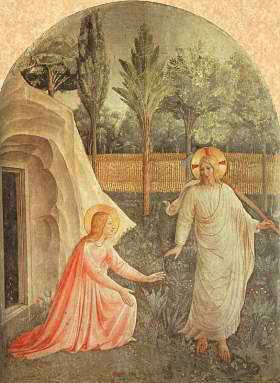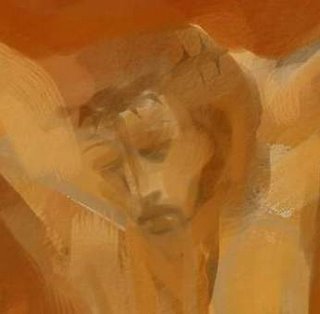
A Sermon for the Third Sunday of Easter based upon Luke 24:36 - 48
In the name of Jesus; amen
I love a good ghost story. If I have a choice between seeing a romantic comedy or a scary movie, I will always choose the scary movie and if ghosts are involved all the better. I like to be frightened when I’m reading a book or seeing a movie; but I also like to be able to put the book away or turn the movie off or leave the theatre and reenter the world of reality where the make-believe is only the stuff of imagination.
There is a show on the Sci-fi Channel called Ghost Hunters. A team of people go around trying to scientifically prove or disprove hauntings. I catch it every once in awhile and I’m always fascinated by it because they go about their jobs as skeptics trying to be proven wrong.
They are lead by Jason Hawes and Grant Wilson, who are Roto-Rooter Plumbers by day and ghost hunters by night. They travel all over the country trying to determine if ghosts really do haunt places. And their web-site is now the most visited paranormal web-site in the world.
Most of the time very little happens and the stories that they have gone to investigate appear to be embellished or made-up entirely. But every once in awhile they find something strange. Noises that shouldn’t be heard or shadows that shouldn’t be seen. Cold spots, a sign of a ghostly presence, occur where it should be warm or, on one episode I saw, a lamp moves for no reason across a bed stand in a haunted hotel.
I have ghost stories too. Ask me about them later if you’d like. Typically when I’m asked if I believe in ghosts I will tell you that there are a lot of things in this world that can’t be explained. Scripture itself is filled with them: demons, possessions, astrology, precognition, and spirits all make appearances in the pages of the Bible. And while we are a modern day people, with modern day understandings of science, that doesn’t necessarily, mean that those things don’t exist.
Today’s gospel reading begins as a ghost story. It is late Sunday night and the eleven disciples together with their companions are hiding out until it is safe to leave Jerusalem. Earlier that day some of the women who were with them had gone to the tomb of Jesus to take spices to properly bury his body. But they had returned with a strange story, a story that they had quickly dismissed because it was illogical and impossible.
They had said that there were angels in the tomb and that the angels had said that Jesus was no longer dead. And when Peter and some of the other disciples had gone to check all they had found was an empty tomb and the linen cloths that had been Jesus’ burial shroud.
Then later two of those who had been with them set out to a town called Emmaus, seven miles from Jerusalem, in an attempt to escape the Roman and Jewish authorities. Their sense of fear was already heightened as they wondered if their friends would make it to safety.
It was now night-time and when the doors opened and it was Cleopas and his companion (perhaps his wife) with another story of Jesus not being dead… well, that’s a classic in the set-up for a good ghost story.
All the elements are there: tension, strange reports, danger. And don’t forget that someone has just died and died terribly. And they all watched it happen and did nothing to try and stop it.
There must have been a great deal of guilt in that room mixed with apprehension and fear. So when Jesus appears out of nowhere it doesn’t matter what he says… they are “startled and terrified and thought that they were seeing a ghost.”
I love a good ghost story and if you ask me later I will tell you stories of some of the strange things that I have seen in my life, but this is not a ghost story.
It might have all the elements of a Stephen King novel and it might give you nightmares if Wes Craven (director of Nightmare on Elm Street and the Scream trilogy) directed a movie about it, but there is a twist in this story that takes it far out of the horror genre: Jesus isn’t a ghost.
“Why are you frightened, and why do doubts arise in your hearts? Look at my hands and my feet; see that it is I myself. Touch and see; for a ghost does not have flesh and bones as you see that I have.” And to prove he’s real he asks for something to eat.
When asked if I believe in ghosts, I will often say that I have seen and experienced some strange things. I will even admit that they are possible, but I will also be clear that I don’t put my faith in them.
We are not a people who believe in an afterlife of spirits or ghosts. I might threaten my husband that if he does something I don’t like after I die that I will come back and haunt him, but I don’t believe that I will and to his credit he doesn’t either.
Instead, we are a resurrection people. That is something entirely different. It is a promise that death isn’t final, but that there is something more. And that “more” isn’t just spiritual… we won’t be ghosts or pieces of ourselves; but whole beings. And it’s not a promise of reincarnation where we keep coming back until we get it right.
The first words that Jesus speaks to his followers who are gathered together in fear and sorrow and guilt are “Shalom” that is: “Peace be with you.” There are implications to that word, Shalom. It implies blessing and wholeness… complete-ness.
We are made complete in the resurrection we have been promised through Jesus’ death and resurrection.
We will not be just spirits, but whole, physical beings made complete through the forgiveness and love of God.
I love a good ghost story, but I love a resurrection story even more because it isn’t a story that I can close up or walk out on like a book or a movie. I love a resurrection story because it includes me and it promises a happy ending that really isn’t an ending.
Jesus took the disciples from fear and terror to wholeness and made them witnesses of the promise that God has made to us and our stories.
Not a ghost story, but a promise of resurrection.
Not a horror story, but a promise of forgiveness and healing.
Not a tragic story, but a promise of victory over death.
Alleluia! Amen!






